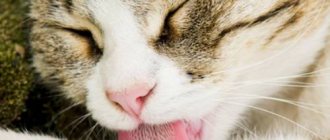The tongue is a muscular organ located in the oral cavity and performs a variety of functions: from participating in the process of receiving, holding and digesting food to recognizing the taste of food.
In addition, for cats, this device is also an excellent assistant in carrying out daily hygiene procedures - you can hardly find a furry pet who has never washed his face in his life, giving his fur a well-groomed and shiny look. The first thing a veterinarian does during a clinical examination of an animal brought to him is to look into the mouth. And this is not surprising: the condition and appearance of the tongue can be used to judge the health of the animal. A change in color, the appearance of plaque, ulcers, wounds on the mucous membrane indicate the beginning of the pathological process.
But the article does not talk about the structure of this amazing organ; we are interested in the question, for what reasons can a cat stick out its tongue? If we think globally and as closely as possible to science, then there are two factors by which the tongue can extend beyond the boundaries of the oral cavity:
- the first is physiological, when there is no reason to worry and such behavior is the norm;
- the second is pathological, when it is necessary to urgently and immediately pay attention to the health of your furry pet.
Physiological reasons for a cat's tongue sticking out
If a cat sticks out its tongue, this is not always a sign of ill health. Cats behave in a similar way during childbirth, and cats sometimes open their mouths and stick out their tongues during sexual estrus. The tongue may stick out slightly from the mouth when cats are caught unawares (for example, the owner discovers the animal eating food from the table, or if the pet, jumping carelessly, breaks a flower pot).
Overheat
Since almost the entire body area of cats is covered with fur, their ability to assess temperature is poorly developed. If overheated, the animal's hair will not be able to act as a thermostat, and the evaporation area will simply not be enough to lower the temperature parameter. There is a need to increase the area of evaporation, which is why the cat pulls out its tongue. Sometimes the animal lies down on the ground and completely relaxes, this contributes to a better cooling process.
To cool down, many cats stretch out on the floor, and when they are petted, they begin to purr
For your information! When dogs and cats are hot, they begin to feel short of breath, and pets tend to stick out their tongues. This is a physiological norm - it helps animals cool their bodies more effectively. Pets have virtually no sweat glands, so nature has provided them with another mechanism of protection from the heat.
Washing
Another reason why cats stick out the tip of their tongue is to wash themselves. When licking fur, the pet is often in a relaxed state, so the cat's tongue becomes longer and may even fall out of the mouth a little. But this happens not only during the procedure itself, but also after it. Kitties sometimes get so deeply immersed in the process of washing that they simply forget about their tongue.
Nausea
A common reaction to nausea in cats is sticking out their tongue. Nausea in animals can occur not only due to poisoning. For example, some pets do not tolerate travel in transport well - they begin to get motion sickness, which leads to poor health. A similar picture can be observed after anesthesia (during sterilization or castration).
How does a pet behave when nauseated?
Stress
In stressful situations, cats often begin to actively lick themselves or simply stick out their tongues and breathe like a dog. This is natural behavior of the animal.
Relaxation
When a cat goes to sleep, its muscular system almost completely relaxes. A cat's tongue may simply fall out of its mouth, especially when the animal has adopted a body position in which the lower jaw droops.
Malocclusion
Not all cats have a correct bite from birth. Some breeds have structural features of the lower jaw, for example, it can protrude forward. This leads to the fact that the teeth do not cover the tongue, and it can easily penetrate outward.
Note! Treatment of a problem bite will be needed if the pet experiences serious discomfort due to an incorrect tongue arcade.
When a cat's tongue sticks out is normal
Veterinarians will name many pathologies in which a cat sticks out its tongue. However, we are not necessarily talking about illness. Do not panic ahead of time if you notice strange behavior in your pet. There are many situations in which a cat’s tongue sticking out is normal. Among the most common are the following:
- The animal is as relaxed as possible. As a rule, this happens during sleep. The tongue, like any muscular organ, should also rest. After all, it already has a lot of functions that tire it. During relaxation, the cat's tongue becomes slightly longer than when it is tense. So it sticks out of the mouth. This feature is unique to pets. Cats living in the wild cannot afford to relax for a second. They are tense even in their sleep, and they always keep their tongues shut.
- Cats stick out their tongues because of the heat. The pet's heat exchange has been disrupted. It is urgent to give him something to drink and move him to a cool place if the cat is in the sun. Without doing this, you can bring the animal to heatstroke.
- Malocclusion is another common reason for a cat sticking out its tongue. The abnormal structure of the jaw is to blame, in which it is shorter than necessary; the organ simply does not fit in the mouth. Malocclusion is common in artificially bred elite breeds. Sometimes this becomes a real shock for cat owners who dream of world fame for their pet. After all, with such a defect, an animal, even if it is of royal blood, will not be able to participate in exhibitions and other prestigious events.
- Another reason is simple forgetfulness. The cat sometimes just gets distracted. Periodically forgets to hide his tongue even after hygiene procedures. This happens, for example, when she was washing her face and the owner called out to her. The cat turned around, but didn’t have time to hide his tongue. As a result, the cute photo is ready.
As you know, cats are very smart and quick-witted animals. Many of them are well trained, and Kuklachev’s wards are an example of this
So, some cats, having stuck out their tongue involuntarily a couple of times and noticing that the owner was delighted, can then do this on purpose in order to attract the precious attention of the owner and other people. Of course, this is a fairly rare reason for a cat sticking its tongue out at you.
Only the most vain (or those experiencing acute attention deficit) or overly intelligent individuals do this.
shutterstock
Additional symptoms
The reasons why a cat opens its mouth and breathes like a dog with its tongue hanging out are:
- Physiological, when rapid breathing is caused by natural processes in the body.
- Pathological, in which the cat breathes with its mouth open due to illness or injury.
Sometimes, during difficulty breathing, the pet may experience pain. Externally, this manifests itself as the following signs:
- the cat looks excited and scared;
- the muzzle is stretched out in an unusual grimace;
- pupils dilated;
- the tail is pressed to the body;
- mustache pressed;
- the animal is aggressive.
Heavy belly breathing is a sign that your cat is not feeling well. It looks as if the pet is trying to inhale air with its stomach and push it out when exhaling. This type of breathing is called abdominal.
Normally, the abdominal muscles should not be used. When healthy, there is a vacuum in the sternum around the lungs. It allows the lungs to expand when inhaling.
In addition to belly breathing, lethargy, aggression and the inability to stand up are dangerous symptoms.
In case of injury or serious illness, air (pneumothorax) or liquid (hydrothorax) may enter the chest cavity, which is why the lungs cannot expand normally and take in air when inhaling.
The compensatory functions of the body are involved: the diaphragm is included in the inhalation process, so it is carried out by the “stomach”.
This condition is extremely life-threatening for the pet and requires urgent hospitalization to a veterinary clinic.
Shortness of breath in cats always indicates that the animal is unhealthy and requires increased attention from the owner.
The cause can be both chronic and acute conditions:
- diseases of the respiratory system;
- progressive anemia;
- recent operations under anesthesia;
- diseases of the cardiovascular system.
Heavy breathing with an open mouth occurs due to oxygen starvation of the body. In this state, you can notice a pose that is not typical for the cat’s normal behavior. It looks like this: the pet spreads its front legs wide, stretches its head and neck (trying to straighten the trachea), opens its mouth and breathes with shortness of breath.
This condition indicates that oxygen from the inhaled air is not delivered to the organs and tissues of the body. As a result, hypoxia occurs - a serious, life-threatening condition.
Another cause of open-mouth breathing is a cat in shock. This is a severe circulatory disorder, also leading to hypoxia. This condition can occur due to injury, allergic reaction and intoxication of the body.
Sometimes a cat may pant heavily after exercise.
Heavy breathing with your tongue hanging out also indicates oxygen starvation. Sometimes such a reaction occurs in a cat after active physical activity. In this case, a blue tongue may appear. After resting a little, the cat returns to normal and all symptoms disappear.
This condition indicates heart failure and requires consultation with a specialist.
Whatever the cause, cough and shortness of breath cannot diagnose the disease. In this case, the complex clinical picture should be considered. When collecting information about the disease, not a single symptom should be discarded.
To make a diagnosis, you should pay attention to:
- general condition (depression, lethargy, anxiety);
- food intake (reduced or the animal refuses it completely);
- drinking water (increased thirst may indicate diabetes, and choking is an additional symptom from dry mucous membranes);
- temperature indicators (an increase in general temperature may indicate inflammatory processes in the lungs and bronchi);
- nasal discharge (mucous, purulent);
- discharge from the eyes (viral rhinotracheitis, toxoplasmosis);
- diarrhea or constipation (bacterial or viral infection, toxoplasmosis, toxocariasis).
Wheezing when breathing
Wheezing when breathing can be dry and wet (squelching). To hear better, you need to use a stethoscope or at least put your ear to your chest.
The cause of inflammatory processes can be either hypothermia or overheating of the animal. At this moment, the body’s resistance decreases, and the virulence of microorganisms increases.
Dry wheezing indicates initial inflammatory processes in the bronchi and lungs. At this moment, the mucous membranes are dry, and their friction is expressed by wheezing, and the cough is manifested by barking sounds. After some time, exudate begins to ooze out and the wheezing becomes moist. At this time, expectoration occurs.
The cough becomes softer, in this case they call it a wet cough. The inflammatory process is always accompanied by an increase in body temperature, depression, and refusal to feed. Initially mucous discharge begins to flow from the nasal openings, and then fibrinous and purulent. The nostrils become covered with dried crusts, which make breathing even more difficult.
We suggest you read: What to do if your cat has yellow teeth
Difficulty breathing and wheezing can occur with viral rhinotracheitis. In this case, a whole complex of symptoms is recorded. However, all of them may not be typical, so diagnosis should be carried out by a specialist.
The owner, when he sees a cat coughing violently and showing signs of suffocation, is very often at a loss.
A cough and a tongue outstretched in a cat cannot be a diagnostic symptom, it’s just something that makes the animal feel better. This is often how cats cough during an asthmatic attack. Rapid bronchospasm makes breathing difficult, and the animal reacts by coughing. After a few minutes, the spasm gives way to relaxation and the animal calms down.
If this happens for the first time, there is no need to be afraid, but you should consult a doctor.
Shortness of breath and difficulty breathing during sleep has the same causes as all others. However, if the cat sleeps separately from the owner, then monitor how often her exacerbation becomes difficult.
While awake, the cat often licks nasal discharge with its tongue and this makes it impossible for them to dry out. During sleep, crusts block the nasal passages, and this can cause difficulty breathing.
It’s a completely different matter if the shortness of breath is so severe that the cat wakes up the whole family at night. Immediate contact to the clinic for a full examination is the best method of help.
Symptoms when you don't need to worry
Relaxation. When the cat is resting or sleeping, she is relaxed, and even the tongue becomes a little longer. Many people have probably often watched how touchingly the edge of the tongue of a sleeping lump sticks out.
Absent-mindedness. After bathing and active licking, the pet may simply forget to hide its “brush” back. Also, after playing actively, the tongue may remain stuck out for a while.
Heat. In the summer, when it is hot outside, cats, like people, suffer from the heat. By sticking their tongue out, they regulate body temperature. If it is very hot, you need to help your pet. In order to avoid heat stroke, it is necessary to move the animal into the shade, be sure to give it water and wet its fur. In the future, monitor his condition. Avoid excessive overheating.
Malocclusion. Some breeds, such as Persians, often have an abnormal bite as a feature. As a result, the tongue does not fit in the jaws and sticks out. This can occur after prolonged selection and genetic changes. Such animals are not allowed to participate in exhibitions and breeding. If a pet has this feature and nothing bothers him, then everything is fine and there is no need to worry.
Excitement. If a cat is stressed, for example when traveling in a car or for other reasons, then the animal is scared and therefore sticks out its tongue. As soon as the cat’s anxiety passes, her condition returns to normal.
The cat opens its mouth and breathes like a dog: reasons
There are also pathological reasons that require doctor's intervention.
The cat opens its mouth and breathes like a dog, reasons:
- If you notice that your cat's rapid breathing with an open mouth and protruding tongue is in no way associated with stress or increased ambient temperature, observe how long this happens.
- It is necessary to pay attention to the accompanying symptoms. These may include vomiting, nausea, loss of coordination, and wheezing. In most cases, cats inhale this way when foreign bodies enter the respiratory tract.
- It could be wool or food debris. This often happens if a pet eats very quickly and tries to get enough quickly.
Pet
When a cat with its tongue hanging out is healthy
Read also: The effect of presence in psychology
Several variations are possible that do not pose a threat to health when the rough tongue is removed from the mouth of an adult or kitten:
- If a cat was cleaning itself by licking its fur, and was distracted by something interesting, for example, a bird flew past or the owners carried food past, he may well forget to hide his tongue and sit, looking into space, looking extremely stupid, and for quite a long time. If the cat is active, eats well, and plays, then nothing bad is happening. She just likes to walk like that.
- Another situation when a cat’s tongue sticking out is the norm is during childbirth. Here the cat has the right to breathe heavily, its body is doing difficult work and its muscles need more oxygen. Observe your pet carefully during labor, but without fuss. Additionally, you may need the help of a veterinarian or a trip to the clinic if labor stops and a caesarean section is required.
- A cat has the right to stick out the tip of its tongue when sleeping , especially deeply. This is a muscle that when it relaxes, it becomes longer. For those who are awake, it is constantly in good shape.
- A simple explanation can also be found when cats stick out their tongues after operations: the anesthesia includes drugs that relax the muscles. Their effect will stop within a day, but in the meantime, you should carefully moisten your pet’s mouth with water.
- Cats may stick out their tongues when flirting with the opposite sex. Moreover, it is not necessary to be nearby; males can smell females in heat 5 kilometers away.
The animal may be “teased” - stress, especially if the cat reacts to an unfamiliar environment, is accompanied by profuse drooling.
Possible diseases
In some cases, a tongue falling out of the mouth is a reason to worry.
How an animal behaves in case of illness Sometimes cats stick out their tongues and breathe like dogs due to diseases such as rhinitis, ARVI, tracheitis, pneumonia and bronchitis.
The main signs of the disease are difficulty breathing, coughing, wheezing when inhaling and exhaling, wheezing, lack of appetite, and nasal discharge. Temperature may also rise and apathy may appear. We suggest you read: Why does a cat eat cabbage?
Poisoning
Cats may sit with their tongue hanging out if their body is intoxicated. Animals may experience symptoms such as disturbances in the functioning of the respiratory tract and coordination, excessive salivation, vomiting, diarrhea, tremors, dilated pupils, and convulsive muscle contractions. Usually in this state the cat feels increased anxiety or complete apathy.
Infections
A protruding tongue can be observed in cats in the case of infectious diseases such as rhinotracheitis, chlamydia and calcivirosis. In this case, animals may exhibit the same symptoms as in the case of respiratory disease. In addition, pets may have bowel movements and purulent discharge from the nose and eyes. The infection can also cause swelling in the mouth, causing the tongue to fall out of the mouth.
Important! If the cat begins to show aggression, it has profuse salivation, an open mouth and bulging eyes, then this may indicate the presence of rabies.
In the case of an infectious disease, the animal also behaves strangely
Tumors
Oncology of the oral cavity is one of the most dangerous causes of a protruding tongue. If there is plaque, bleeding, bad breath, a hoarse voice, problems chewing or swallowing, or painful mouth ulcers, your pet needs immediate medical attention.
Note! A cat can stick out its tongue not only due to a malignant tumor, but also in the case of polyps located in the oral cavity.
Such a serious illness as heart failure is often accompanied by pulmonary edema. This causes the cat to try to breathe from its belly rather than from its chest, with its tongue usually sticking out. Signs of this disease are a weak appetite or its complete absence, the tongue and gums acquire a blue tint, a distinct hoarseness appears when breathing, the heartbeat quickens, coordination of movements is impaired, the work of the hind legs is not always synchronous, some of the receptors may be paralyzed. Cats may also stick out their tongue due to conditions such as ischemia, angina, and hypertension.
Sometimes you can observe that a cat sticks out its tongue and at the same time breathes very heavily. This usually happens when there is a problem with the kidneys. Signs of kidney failure are the following symptoms: unpleasant odor from the mouth (with an ammonia taste), vomiting and diarrhea, mucous membranes acquire a yellow tint, deterioration in the condition of the coat and skin, weight loss. The cat may also experience extreme thirst, frequent urination, blurred vision, and severe swelling in the abdomen.
An animal that gets too playful may swallow a small toy.
A sticking out tongue is a common reaction to such a problem. If a foreign object is in the respiratory tract, the cat usually begins to actively sneeze, cough (in some cases with blood), her eyes water and her breathing is impaired (heavy, frequent and noisy inhalations and exhalations).
Sometimes a similar reaction of an animal can be observed in case of allergies. The most common allergens are medications or food consumed. As a result, swelling of the larynx may occur. Symptoms include enlarged palate and tonsils, respiratory problems (infrequent, deep and slow breaths may be accompanied by coughing), slow heartbeat, problems swallowing, hoarse voice and restlessness.
Jaw injury
If there is no appetite, excessive salivation and prolapse of the tongue, the cat should be checked for a dislocated jaw. In case of bilateral dislocation, the pet is deprived of the ability to close its mouth. If a unilateral dislocation occurs, then the animal’s mouth, as a rule, is slightly open, with the jaw noticeably protruding to the side.
Sometimes cats have problems with breathing and oral control in cases of stomatitis and gingivitis. The animal's tongue, being behind the teeth, can touch painful ulcers (stomatitis) or inflamed gums (gingivitis). The only thing a cat can do to alleviate the discomfort is stick out its tongue.
We invite you to familiarize yourself with: Exotic shorthair cat character habits
Note! In the case of gingivitis, the symptoms are almost completely the same as dental ones (with the exception of ulcers).
Inflammation in the oral cavity can greatly bother a cat.
In cases of disturbances in the activity of parts of the brain responsible for respiratory and other processes, cats may experience problems with tongue control, which are caused by difficulty in inhaling and exhaling.
Causes for concern
If mom and dad notice that the baby is constantly opening his mouth, sticking out his tongue, you need to visit a specialist. Let's talk about the most common ailments that accompany the “bad habit.”
Frenum defects
About a third of all newborns have a short frenulum. This pathology is called ankyloglossia. It occurs much more often in boys than in girls. A mucous membrane connects the tongue to the floor of the mouth. It is either not attached correctly (starting from the middle) or is less than 8 mm in size. Causes of pathology:
- mother's age (over 35 years);
- diseases and stress during pregnancy.
If the pediatrician diagnoses ankyloglossia, a minor cosmetic surgery is performed and the frenulum is trimmed. The newborn does not feel pain, the process is not accompanied by anesthesia. Timely intervention will help avoid problems with breastfeeding, speech defects, and discomfort for the baby.
Problems with the gastrointestinal tract
Most often these include gastritis, constipation, and high acidity. Thus, a reaction to early introduced complementary foods may occur. There is no need to panic, but if you notice that colic and bloating are accompanied by mouth opening, see your pediatrician.
With otitis media, sinusitis, and rhinitis, the nasal sinuses are clogged with mucus. The baby is forced to breathe through his mouth. This is especially noticeable during sleep. If you observe that, in addition to opening the mouth, the baby:
- watery discharge from the nose appeared;
- sneezing does not stop;
- noises are heard when breathing;
- increased temperature;
- there were difficulties with feeding;
- a cough developed.
Most likely, the child involuntarily pulls his hands towards the sore spot (nose, ear). Don't hesitate to see a doctor. Inflammatory processes not only cause pain and discomfort to the baby, but can also lead to irreversible loss of smell and hearing. Contact an ENT specialist, he will quickly make a diagnosis based on an external examination and analysis of mucosal secretions.
Muscle weakness
If a newborn periodically opens his mouth in his sleep in the absence of other symptoms, there is no need to sound the alarm until the child is six months old. The phenomenon is not a serious pathology; as a rule, it goes away on its own. The habit should not be left unattended. This may lead to increased salivation in the future. The disease is treated with massage courses, sometimes with injections of drugs for tone.
Hypothyroidism
Thyroid dysfunction. In addition to prolapse of the uvula, jaundice, an increase in body weight and head circumference are added. Appetite may be reduced. Drowsiness and constipation are noted. The child cries hoarsely. It is necessary to show the baby to an endocrinologist. He will take the necessary tests (blood for the hormones TSH, T4, biochemical urine), perform an ultrasound of the thyroid gland, and palpate it.
Facial muscle atrophy
With pathology, the child experiences the so-called “flaccid child syndrome.” Normal muscle tension, including facial muscles, decreases, as a result of which the tongue falls out during sleep. The baby's face resembles a mask. He does not smile or grimace, like most healthy children of this age. The skin is dry, with spider veins. The screams are sluggish, weak, muffled. Strabismus may develop. Additionally observed:
- drooping eyelids;
- facial asymmetry;
- excessive swelling of the lips;
- absence of natural folds on the skin.
The reasons are:
- congenital partial loss of skin;
- birthmarks;
- hemiatrophy of the facial skin.
Consultation with a pediatrician is required. He conducts an external examination, palpation, collects the mother’s pregnancy history, takes the necessary blood tests, and examines the lists of medications that were given to the baby. MRI and CT are used as additional diagnostics. The disease is treated with medication. Massage is often prescribed.
Candidiasis
A whitish coating on the gums, the surface of the tongue, and on the mucous membrane of the cheeks indicates a possible thrush. The Candida parasite provokes unpleasant sensations and causes discomfort. To make this clear to the parents, the child opens his mouth every now and then. Associated symptoms include loss of appetite, sleep disturbance, and frequent crying. Causes:
- weak immunity;
- dry indoor microclimate;
- mother's illness.
Diseases can be provoked by frequent regurgitation, mechanical injuries to the mucous membrane, and treatment with hormones. This is an inflammatory process that requires immediate treatment. The pediatrician takes a swab from the oral cavity, identifies the growth of fungal flora, and prescribes antibiotics and antifungal drugs. It is recommended to increase the humidity in your child's bedroom using a humidifier.
Stomatitis
Small ulcers affect the inner surface of the cheeks and gums, causing pain and injury. Therefore, the child tries to stick out his tongue. The disease occurs due to:
- injuries to the mucous membrane (in newborns it is thin and easily damaged);
- exposure to germs (with a pacifier, toy);
- low immunity;
- underdevelopment of the aseptic properties of saliva.
With stomatitis, in addition to opening the mouth during sleep, the child experiences:
- ulcers and white plaque on the gums;
- swelling and redness of the mouth;
- increased body temperature;
- bad breath;
- restless sleep.
First of all, you need to show the baby to the pediatrician. Depending on the advanced stage of the disease, he may additionally refer you to a pediatric dentist, immunologist, or infectious disease specialist. To diagnose the disease and exclude the possibility of other diseases, a smear is taken from the baby’s oral cavity. Treatment is carried out with medication, with accompanying treatment of the mucous membrane with decoctions and special ointments.
If a child constantly opens his mouth in his sleep and has difficulty breathing through his nose, it is necessary to show him to an ENT doctor
Intracranial pressure, like blood pressure, fluctuates depending on the toddler’s activity and time of day. But there are pathologies in which overestimated values of the indicator are observed. These include:
- tumors;
- hematomas;
- inflammation of the brain and central nervous system;
- injuries;
- improper circulation of lymph in the cerebral cortex.
Non-professional doctors often make this diagnosis. But it is important to understand that this is not an independent disease that can be cured with pills. A neurologist is consulted, who prescribes an ultrasound or MRI with contrast to identify the cause. If there have been injuries, there is a suspicion of a tumor, the child has suffered a severe infection, his mouth is constantly opening, his fontanel is protruding, his skull circumference is larger than normal, it is necessary to urgently visit a doctor.
Hypotonicity
Disturbance in the supply of neural signals from the brain to the facial muscles. As a result, the tongue often falls out of the mouth; its structure is loose. The child not only controls the organ poorly. Parents notice that the child does not want to roll over, does not try to get up, and does not sit well. He draws his legs in and hangs by his arms.
- general drowsiness;
- poorly developed sucking reflex;
- slow weight gain;
- lack of emotions.
Hypotonia can be caused by incorrect delivery. For consultation they are referred to a pediatrician or neurologist. The diagnosis is made on the basis of ultrasound. The necessary medications and vitamins (calcium, magnesium) are prescribed, in addition, physiotherapy (massage courses) is prescribed. Constant monitoring by a specialist is required to completely overcome the disease.
We hope that thanks to our material you have figured out the reasons for your baby’s tongue sticking out. In most cases, this habit does not mean anything, it is how the child learns about the world or is shown to the parents something. But if you notice alarming accompanying symptoms, consult a doctor immediately. Be healthy!
- Orange coating on the tongue causes - ProfiMed
Why does a cat stick out its tongue and breathe frequently?
Frequent breathing with an open mouth can be caused by hair getting into the respiratory tract.
Why does a cat stick out its tongue and breathe quickly?
- Cats can lick and preen themselves for a long period of time, so the hairs get into the respiratory tract.
- In this case, the animal may begin to cough and vomit.
- In most cases, nature provides that the pet simply gets rid of some of the fur from the respiratory tract and intestines by vomiting.
Kitten Heavy breathing with a protruding tongue is often observed if the cat has broken ribs.
Perhaps this happened during an active walk, or pampering. Cats, despite their plasticity, can also fall and break ribs. The cat is breathing with its tongue hanging out, what to do:
- In this case, take a closer look at the deformation of the chest and the presence of other injuries. However, there may be more serious symptoms, which are indicated by heavy breathing with an open mouth.
- If your pet has a cold, mucous may accumulate in his nose. That is why breathing through the nasal passages is impossible, so the cat inhales through the mouth.
- It is necessary to treat a cold in an animal. The infection can spread from the upper respiratory tract to the lower. Therefore, it is necessary to prevent the occurrence of bronchitis or pneumonia.
The kitten is tired. Often the cause of an open mouth can be estrus, or sexual heat.
At this time, hormones are raging in females and males, a huge amount of them is released into the blood, which can increase blood pressure and increase breathing. So don't be surprised if your cat is in heat and breathes through her mouth with her tongue hanging out. Why does a cat breathe frequently during heat:
- But there can also be very serious reasons for a cat breathing through its mouth. Among them are oncological diseases. There may be a cough with mucous, purulent and bloody discharge. In this case, you need to consult a doctor.
- Scientists have proven that obese cats can also breathe with their mouths open. Just as fat people experience shortness of breath and heavy breathing due to obesity, the same thing happens in cats. It is difficult for them to perform even the simplest physical activities, which in turn leads to heavy breathing, the cat is forced to open its mouth and stick out its tongue.
- With some diseases of the liver, kidneys, and excretory system, there may be breathing with an open mouth. This is usually observed with pyelonephritis, or severe liver dysfunction.
If you notice that your pet is breathing with his mouth open, but he does not have any other symptoms, and heavy breathing is associated with physical activity, there is no cause for concern. However, if the animal breathes for several hours or even days with its mouth open and tongue hanging out, this is a reason to urgently contact a veterinarian. Perhaps, if you consult a doctor in a timely manner, you will be able to save your pet from imminent death.
How to determine whether it is normal or pathological
In order to understand what is happening to the pet, whether a protruding tongue is a normal physiological reaction or a pathology, experienced veterinarians recommend touching the tip of the cat’s tongue with your finger.
If it immediately retracts into place, then there is no cause for serious concern. When the cat initially hid his tongue, and after a short time began breathing through his open mouth again, it is better to go to the clinic.
Although professional breeders first examine the pet themselves:
- Mouth - for stuck objects and ulcers (gingivitis or stomatitis).
- Eyes - whether there is conjunctivitis or lacrimation.
- Nose—stuffiness or mucus discharge.
- Ears, tail, paws, whole body.
In addition, they check the general reactions of the body and measure the temperature.
What to do
If you suspect that the kitten has a specific facial expression because it is sick, you need to visit a veterinarian and strictly follow his instructions. Don’t worry that you will bother the specialist unnecessarily. An examination is never superfluous, and it is much better to know for sure that everything is fine with the cat than to cause the disease to develop.
We figured out why cats stick out the tip of their tongue, and now you can easily understand when a tongue sticking out causes a smile, and when it is a menacing symptom. If you have any doubts, it is better to see a veterinarian.
When a cat sticks out the tip of its tongue, this is most often not normal. The reasons for the unusual phenomenon may indicate discomfort experienced by the animal or diseases (congenital or acquired).
Language functions
To understand why a cat sticks out its tongue, you first need to understand what functions this muscular organ performs. A cat's tongue performs a number of important functions:
- helps in the process of swallowing, nutrition;
- allows you to recognize the taste of food;
- allows for hygiene procedures.
We suggest you read: At what age do cats lose their baby teeth?
In its normal state, the tongue is located in the mouth. But there are times when the owner complains that the cat constantly sticks his tongue out. But this phenomenon is not always considered pathological. There are also physiological reasons why a cat sticks out the tip of its tongue.
Physiological characteristics or illness?
Cats often stick out their tongues or open their mouths when they smell something interesting. You may notice that even your pet's whiskers stretch towards the scent of interest. This behavior is explained by the fact that in addition to the receptors in the nose, the cat detects odors with its tongue and air waves with its mustache. No, this is not a mistake, the tongue also has receptors responsible for the assimilation of smell, and they are there, and yours are simply not as developed as those of a cat.
Many young cats stick out their tongues when hunting or imitating it. In this case, there are two reasons: instinct and passion. The cat sticks out its tongue to enhance the smell and it does this unconsciously, but instinctively. A young pet, engrossed in play, may stick out its tongue and not even notice it. Moreover, the cat can walk like this for a long time after playing and not experience discomfort.
Veterinarians identify the reasons why a cat sticks out its tongue:
- Relaxation. During rest and sleep, the jaw muscles are maximally relaxed, which leads to prolapse of the muscular organ.
- Thermoregulation. If a cat is hot, it sticks out its tongue, thereby trying to normalize the temperature.
- Absent-mindedness. A cat may simply forget to retract its tongue after licking fur or active games.
- Bite. Due to malocclusion, the tongue simply does not fit in the cat’s mouth. That's why it sticks out. Such pets do not qualify for participation in competitions and exhibitions based on their appearance.
- Childbirth. Before the expected birth, the cat's behavior changes. She becomes excited, her breathing quickens, her mouth is slightly open, her tongue sticks out.
- Praise. The cat sticks out its tongue in response to praise. If the owner is constantly touched by the sight of a cat with a hanging tongue, then the animal will systematically carry out such an action for the sake of approval.
- Hunting. When hunting, cats involuntarily stick out the tip of their tongue. This is due to the fact that in this position of the muscular organ the animal’s sense of smell increases.
- Age. A cat who has crossed the age of 8 may have loose teeth and fall out. From the cracks that appear, the tongue freely looks out of the oral cavity.
Respiratory problems
If you ask your veterinarian why cats stick out their tongues, he will answer that this may be due to dysfunction of the respiratory system. Everything is explained very simply. When something interferes with the air supply, the animal tries to breathe deeply and often. To do this, it opens its mouth wide and shows its tongue. Respiratory diseases in cats are the same as in humans. Among them:
- rhinitis;
- sinusitis;
- laryngitis;
- bronchitis;
- pneumonia
A sick animal definitely needs help. After all, it cannot sleep or eat normally. The most important thing is that there is a lack of oxygen, which has an extremely negative effect on the general condition of the body.
Natural "refrigerator"
A cat's tongue is simply indispensable in hot weather.
By licking the surface of the fur coat, the purr reduces the air gap between the skin and the surface of the fur, thereby promoting better cooling of the body. When it becomes completely unbearable, the animal sticks out its tongue and begins to breathe quickly. Moisture evaporating from the surface of the tongue helps further reduce body temperature. Many of us have cats or cats living at home. Some are purebred, some are not. However, for all representatives of the cat family, we take this fact for granted, without even thinking about the nature of this phenomenon. Why do cats have rough tongues? Why do they need such a language and what functions does it perform? Let's answer these questions.
Stress
The cause may be stress in cats. We will look at the symptoms and treatment below.
If the pet is stressed, the tongue will stick out. For example, when driving a car, if the cat is afraid, then the tongue will hang out the whole way. Fear, nervous shock, negative emotions are the reasons that cause stress in cats. When an animal is nervous, the following symptoms appear:
- tongue sticking out;
- the cat is shaking;
- the pet is trying to hide;
- meows constantly.
If the cat is scared, the symptoms may recur. Therefore, the animal requires treatment. He needs to be provided with complete rest. If necessary, the veterinarian will prescribe sedatives.
Signs of diseases
Veterinarians identify a number of symptoms that, together with a protruding tongue, indicate various diseases:
- difficulty breathing;
- the cat is lethargic and does not play;
- the pet becomes aggressive;
- the oral mucosa is red, and sometimes a bluish tint appears;
- dry mucous membrane;
- lack of appetite;
- wounds, mouth ulcers.
If your cat develops the above symptoms, you need to immediately take him to the clinic for examination.
Heat
The main physiological reason why a cat sticks out its tongue is temperature regulation. The animal protrudes the organ to reduce discomfort, for example, during heat. This prevents the development of heat stroke. In this case, the owner should take the cat to a cool place and pour water on it.
But a cat's tongue sticking out can also be a signal of high body temperature. To understand whether your pet is suffering from heat or is sick, you need to figure out what temperature is considered normal in cats.
The normal temperature for a cat is 38-39 degrees. But don’t panic right away if the indicator deviates slightly from the norm. Here are the common reasons for the thermometer to shift:
- immediately after sleep, the thermometer drops by a couple of divisions;
- in the evening the cat’s body temperature will be higher than in the morning;
- Kittens have a slightly higher temperature than adult animals.
If the temperature rises due to illness, you should not self-medicate - the animal should be taken to the veterinarian.
Normal conditions
In what cases is a protruding tongue considered normal? Cats usually do not show this part of their body. It is considered normal if the tip of the kittens’ tongue remains protruding when they, having played enough, fall asleep from fatigue.
Adult animals may simply forget to retract the “natural sponge” back after washing. It happens that a cat sticks out the tip of its tongue and freezes for a while in this position. Then he definitely puts it in his mouth.
The protruding tongue of an animal that is in a relaxed state or in sleep is also normal. At this moment, the organ lengthens somewhat and does not fit completely in the mouth. After active play, the cat may pant frequently for some time. In this case, the tip of the tongue sticks out. This helps saturate the tissues with oxygen.
The cause of the protruding tip of the tongue is heat. Animals do not have sebaceous glands, which is how they protect themselves from overheating. Some pets can tease their owners. If this short-term phenomenon (especially during the game) is not accompanied by other alarming symptoms, then it is normal.
Cardiovascular diseases
The heart is an important organ. Any disturbances in the functioning of the cardiovascular system are dangerous to the life of the animal. Due to chronic or acute heart disease, oxygen does not reach vital organs in sufficient quantities.
Improper heart function is accompanied by symptoms:
- the cat is lethargic, there is practically no movement;
- heart rhythm is abnormal;
- rapid breathing;
- tongue sticking out;
- The oral mucosa has a bluish tint.
Any disturbance in breathing or heart rhythm is a signal from the cat’s body about the need to visit a veterinarian. Lack of help can lead to the death of the animal.
Oral problems
Unfortunately, a cat does not always stick out its tongue for harmless reasons. This may be a symptom of oral pathologies or jaw dysfunction. Among them:
- fracture, bruise or dislocation of the jaw bone;
- dental diseases (gingivitis, periodontal disease, stomatitis), in which the tongue swells, the cat experiences pain and tries to alleviate its condition by sticking it out;
- various tumors located in the oral cavity.
Ulcers, cracks and other lesions of the mucous membrane may be of a secondary nature. That is, it is a symptom of organ diseases that have nothing to do with the oral cavity. For example, acute renal failure, uremia, serious viral infection. If a cat suddenly begins to stick out its tongue, while the mucous membrane in its mouth is damaged, the situation cannot be left unattended. Veterinarian assistance is needed.
Functional brain disorders
Veterinarians identify the causes that lead to disruption of the brain and nervous system:
- traumatic brain injury;
- past infectious diseases;
- stroke.
The above reasons lead to a lack of coordination: the cat cannot independently control movements or control muscles. So he sticks out his tongue.
Veterinarians offer a small test that helps make sure that your cat has no neurological problems. If the animal sticks out its tongue, you need to touch it a little. If there are no neurological problems, the cat will quickly hide its tongue. If the actions do not bring results, we can talk about a pathological signal from the body.
Diseases that cause cats to stick out their tongues
A protruding tip of the tongue appears due to various diseases. These include swelling of the larynx, allergies, and inflammation of the mouth. A protruding tongue appears due to :
- jaw injuries;
- cardiovascular failure;
- disorders in the functioning of the brain;
- nervous diseases, stress;
- traumatic brain injuries;
- high temperature;
- muscle atrophy;
- dental diseases;
- disturbances in breathing or functioning of the salivary glands.
The cat cannot move its tongue after anesthesia. The mouth closes completely only after a day. Wounds in the mouth area prevent you from removing your tongue. If this phenomenon is accompanied by cough, vomiting, diarrhea or intestinal disturbances, then the cause is most likely poisoning.
If the tip of a cat's tongue sticks out, there can be many reasons for this, and most of them do not indicate disease. Some pets, realizing that the owners are touched and give something tasty, repeat the trick several times on purpose.
Source











